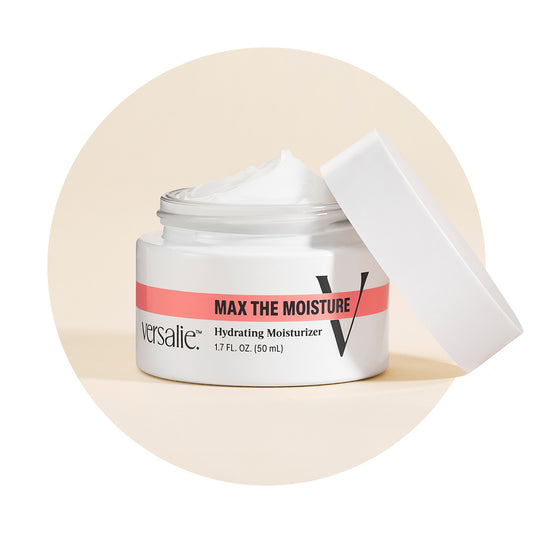Menopause is a natural transition that over 1 million people go through every year. But let’s be honest, it can have some frustrating symptoms. From night sweats that leave you tossing and turning to brain fog that has you searching for your keys…again, menopause can really test our resilience.
If you’ve found yourself in the supplement aisle or searching online for menopause symptom relief, you may have heard that magnesium may help. As a registered dietitian on my own perimenopause journey, I’ve delved into whether magnesium can help ease some of the most common menopause symptoms.
Always talk to your doctor before taking supplements or making changes to your diet.
What’s magnesium and why is it important?
Magnesium is an essential mineral involved in over 300 bodily processes, including bone formation, making proteins, and muscle and nerve function. Your body can’t produce magnesium, so you need to get it from food or supplements. Foods rich in magnesium include dark leafy greens, beans, lentils, whole grains, nuts, and seeds. However, about 48% of Americans are getting less magnesium from their food and drinks, than the average amount needed for most healthy individuals. The estimated average requirement is the amount that’s supposed to meet the needs of most healthy people.
This is especially concerning as we age because our bodies absorb less magnesium and excrete more. Lower magnesium levels may worsen symptoms like poor sleep, stress, and memory issues.

Different types of magnesium and what they help with
As a supplement, magnesium is available in several forms, each with its own effects on the body.
- Magnesium glycinate. Easy to absorb and may support relaxation, improved sleep, and anxiety relief.
- Magnesium citrate. Helps with occasional constipation relief and can have a mild laxative effect.
- Magnesium L-threonate. Easier for the body to absorb than other forms and may help improve sleep quality.
- Magnesium malate. May help improve energy levels, but more research is needed to confirm this.
- Magnesium oxide. Helps with the relief of upset stomach but is not well absorbed.
How magnesium can help with menopause
You may be all too familiar with the hot flashes, night sweats, mood swings, brain fog, sleep disruption, and bone loss associated with menopause. While magnesium isn’t a cure, research suggests it may help ease some of its most frustrating symptoms.
Sleep struggles and insomnia
Struggling to get a good night’s sleep? You’re not alone. Up to 60% of those going through menopause report sleep disturbances. Magnesium can help the body adapt to stress and regulate neurotransmitters that promote relaxation, potentially improving sleep. It also plays a role in melatonin production, so it may also help you fall asleep easier.

A study of adults aged 35-55 with poor sleep found that those who took 1 gram of magnesium L-threonate 2 hours before bed for 3 weeks had significantly more deep sleep. They also had improved mental alertness, productivity, and mood during the day compared to those who took a placebo.
Bone health
Getting more magnesium may help keep your bones strong and reduce the risk of osteoporosis, both before and after menopause. Studies show that high magnesium intake is associated with higher bone mineral density. And research suggests that people with osteoporosis have less magnesium in their blood. A 2021 review found that taking 250-milligrams or more of magnesium was associated with significantly increased bone mineral density and decreased fracture risk.
Heart health
When we think of menopause, hot flashes, brain fog, weight gain, and other common complaints often come to mind. But there’s another, less obvious effect of the menopause transition — a significantly increased risk of cardiovascular disease.
Magnesium may support heart health in several ways. It helps maintain healthy blood pressure levels, lower risk of metabolic syndrome and type 2 diabetes, and decrease inflammation. In studies, higher magnesium intake is associated with lower risk of coronary heart disease and stroke, lower blood pressure, and healthier cholesterol levels.

More research is needed to understand how magnesium affects heart disease risk in people after menopause. But getting enough magnesium through diet or supplements helps support heart and overall health.
What to look for in a magnesium supplement
With so many different supplement brands and types of magnesium, it can be hard to choose the right one. (I know I’ve stood frozen in the supplement aisle facing that wall of magnesium supplements, too!) Let’s break it down.
- Magnesium glycinate. May help with sleep and anxiety.
- Magnesium L-threonate. May help brain fog and cognitive health.
- Magnesium citrate. Helps with occasional constipation.
Choose a magnesium supplement that provides no more than the Tolerable Upper Intake Level (UL). For magnesium, this is 350 milligrams of elemental magnesium daily for adults.
As with all supplements, opt for a trusted brand that has been third-party tested and certified for purity and quality.
Potential side effects
Magnesium supplements are generally safe for most people when taken in recommended doses below the UL of 350 milligrams. While you can’t get too much magnesium from the foods you eat, you can take too much supplemental magnesium.
The most common side effects from taking too much magnesium include:
- Diarrhea.
- Nausea.
- Abdominal cramps.

Although rare, it’s possible to develop magnesium toxicity. This can cause low blood pressure, nausea, vomiting, facial flushing, muscle weakness, difficulty breathing, irregular heartbeat, and even cardiac arrest. Magnesium toxicity is typically only seen with large doses of magnesium-containing laxatives and antacids providing more than 5,000 milligrams of magnesium per day.
People using the following medications should consult a healthcare provider before taking magnesium supplements, as there may be interactions:
- Bisphosphonates used to treat osteoporosis.
- Certain antibiotics.
- Diuretics.
- Proton pump inhibitors.
Takeaway
Magnesium is an essential mineral involved in hundreds of bodily processes. Many of us, especially those of us in midlife and beyond, don’t get enough magnesium from the foods we eat.
During the menopause transition, eating magnesium-rich foods and taking magnesium supplements may help ease some symptoms, including trouble sleeping, dealing with stress, and brain fog. Magnesium may also help improve bone density and heart health, two important concerns for people in midlife.
Magnesium supplements are safe for most people, but they can interact with some medicines. Taking too much can cause side effects like diarrhea. Talk to your healthcare provider about whether magnesium supplements are safe for you and which type is best for you.
 FAQs
FAQs
Does magnesium help with menopause?
Magnesium supports bone density and heart health. It may also help with some symptoms of menopause, like trouble falling asleep, anxiety, and brain fog.
Which type of magnesium is the best for menopause symptoms?
Magnesium glycinate and magnesium L-threonate are good forms of magnesium to help with menopause symptoms. Magnesium glycinate is well-absorbed and may help improve sleep and calm anxiety. Magnesium L-threonate may be best for cognitive support and brain fog. If you have occasional constipation, magnesium citrate is another good choice that may help.
Does magnesium help with hot flashes?
There still needs to be more research done. A small, older study on women with breast cancer found that taking 400-800 milligrams of magnesium oxide daily for 4 weeks significantly reduced hot flash frequency by more than 41%. However, a larger, randomized, placebo-controlled study found no associations between magnesium oxide supplementation and the frequency or severity of hot flashes in women after menopause with a history of breast cancer.








